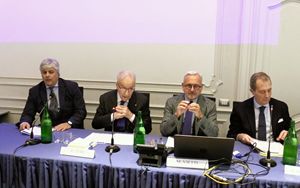(Finance) – “The reform has given a good account of itself in these twenty years where everything has happened. From the economic crisis of 2008 to the most recent ones, the institutes introduced have held up well, demonstrating a fundamental truth: the rule in commercial law is not a pure superstructure but serves to guide the market. The latter has its dynamics, but if it can have agile, proactive and flexible rules, the entire economic system works better. And we have achieved this objective.” They are the words of Michele Vietti, extraordinary professor at the Lumsa University of Rome, author of the 2003 corporate law reformwho spoke during the conference “Capital companies twenty years after the Vietti reform” promoted byOrder of chartered accountants and accounting experts of Naples.
“With the reform, rather than simplifying, we have modernized, drawing inspiration from other European and Anglo-Saxon systems with alternative governance systems and offering a plurality of legal instruments in the name of the autonomy of the entrepreneur who is the best judge of their usefulness. The reform – he added Vietti – has also bet on professionals because they are the entrepreneur’s consultants and help him to orient himself among the different opportunities that the rules offer in order to do his job better”.
“It is a reform that has made history. Legislative Decree 6/2003 – he said Eraldo Turi, president of Odcec Napoli, introducing the works – he innovated, modified and built all the new commercial law that had remained stuck in the 1942 code. New rules updated to the new social and entrepreneurial fabric. There are certainly further innovations and additions but what has been done already offers an excellent result as far as corporate law is concerned. Let’s think for example of LLCs, which are the most widespread companies in the entrepreneurial sector with the peculiar characteristic of attesting their rules to the realities of entrepreneurs and their companies or companies”.
At the meeting, moderated by Nicola Rocco of Torrepadula, professor of the University of Salerno), the delegated councilors of Odcec Napoli spoke Fabio Cecere And Roberto Coscia.
The reports were entrusted to Massimo De Andreis, general director of SRM and President of the Italian Association of Business Economists; Luigi Abete, councilor of the Civil Section of the Court of Cassation; Amedeo Bassi, Faculty of Economics of the University of Naples; And Carlo Fiorentino, vice president of the Odcec Napoli corporate law commission.
